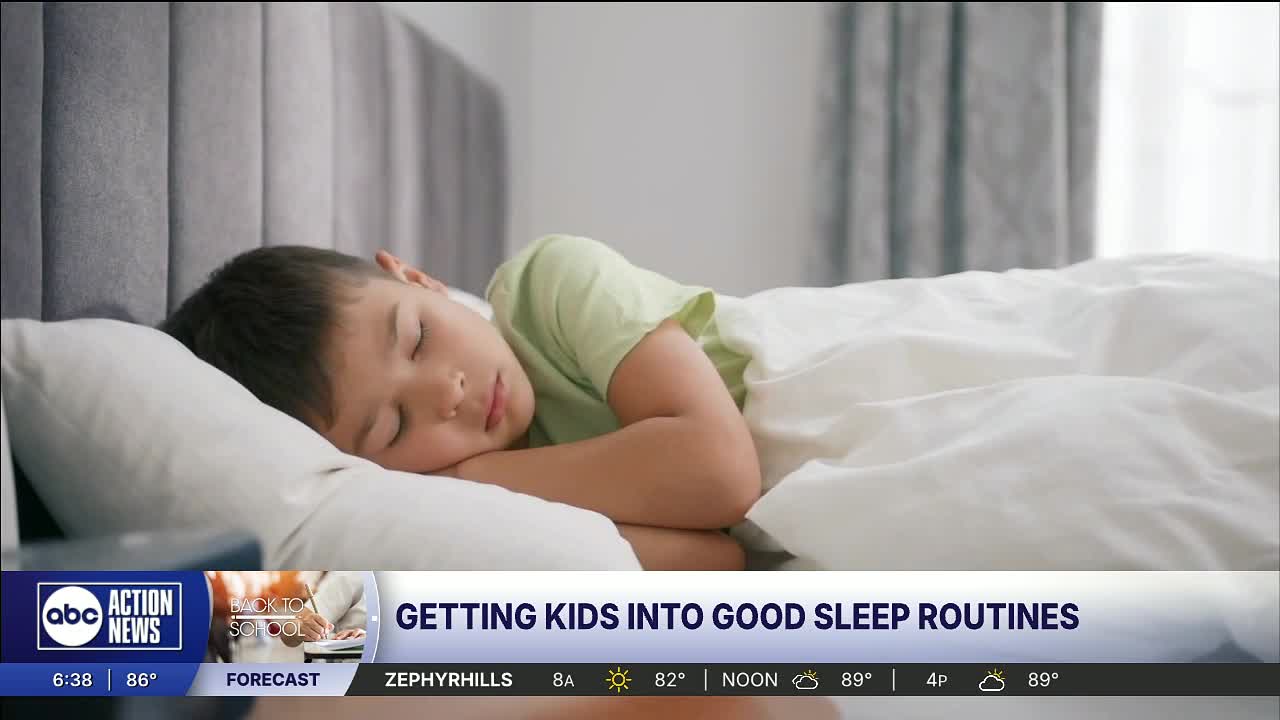As we approach the first day of school, parents and caregivers should be thinking of ways to get their students back into their sleep routines.
For so many kids, summer is a time without a schedule or a routine, and getting back into one can be challenging.
Experts recommend starting to move their bedtime up about 15 minutes every two or three days (roughly about two weeks before school starts) so the child doesn't notice a huge difference.
WATCH Local doctor gives advice for getting kids back into a sleep routine
Also, get them used to putting the screens down and away and finding something more relaxing to do before bedtime.
"If it's taking like, an hour or more for your child to fall asleep, that's one sign," Dr. Luis Ortiz, sleep medicine physician at Johns Hopkins All Children's Hospital, said. "If they're having daytime consequences of not sleeping well or taking too long to fall asleep, like their school grades are doing poor, they're having hyperactivity, impulsiveness, behavioral problems, those could be signs of insufficient sleep or disrupted nighttime sleep. At that point, you don't want things getting worse for your child at school, and you need to have some kind of intervention in place, whether that's behavioral modification strategies or actual medications that require that kind of input from a sleep medicine specialist or your pediatrician."
The perfect bedtime routine
"You want to put in a lot of the exciting stuff at the beginning and the more calming and relaxing things at the end, closer to when you're lying in bed. If a parent has to leave for work at night, you know that needs to be the first thing, because that's a big change in the home. Taking a shower, brushing teeth, doing anything that kind of irks the child—you want to do that first, and then lying down in bed, reading a book or telling a bedtime story, listening to calming music, all these nice, relaxing, boring things. That's what you want to do immediately before you turn off the lights."
Elementary school-aged children
"Elementary school-aged kids typically need a lot more sleep than you realize. A six-year-old may need 10 or 11 hours of sleep at night, and that doesn't really change much until they reach adolescence at 12, 13, 14. Oftentimes, I get some patients who say, 'My child is so sleepy during the day,' and they just get six or eight hours. That's not enough. They're getting two less hours of sleep than they actually need. No wonder they're acting sleepy, tired or cranky. Your child is going to need more sleep than you do. The American Academy of Sleep Medicine offers a nice little calculator. You plug in your child's age, what time they need to wake up in order to get to school on time, and then they'll spit out a nice bedtime."
Middle and high school-aged children
"It is tough, and so you gotta balance like this: an extra layer of wanting to be individuals and also wanting to hang out with their friends who may not even live in the same time zone as they do. But I think the first thing is, you have to have an honest conversation. We're doing this for your health. We're doing this so you feel good when you wake up in the morning. You're gonna have to wake up at this time. How do you think you're gonna feel if you only get four hours of sleep, and then you gotta start putting in, like, electronic curfews, basically, you know, it's 10 o'clock at night for the next two weeks. You may not need to go to sleep at 10, but you're definitely not gonna go on your video game system or social media or what have you."
Other issues?
"I think always keep in mind that if you're doing everything right, and it looks like your child is sleeping through the night, but they're still acting sleepy and tired, that's still another reason to get input from a sleep medicine specialist. There are other disorders, such as sleep apnea and narcolepsy, that can pop up at this age and can kind of look like you're sleeping through the night, but disrupt the nighttime sleep quality in and of itself.
I would say 2% to 6% of the US pediatric population will have sleep apnea. Some of it can be due to enlarged tonsils or adenoids. Sometimes it can be due to obesity, and so if your child is snoring, sleeps through the night but wakes up really tired or grumpy, that could be a sign that they have sleep apnea."




